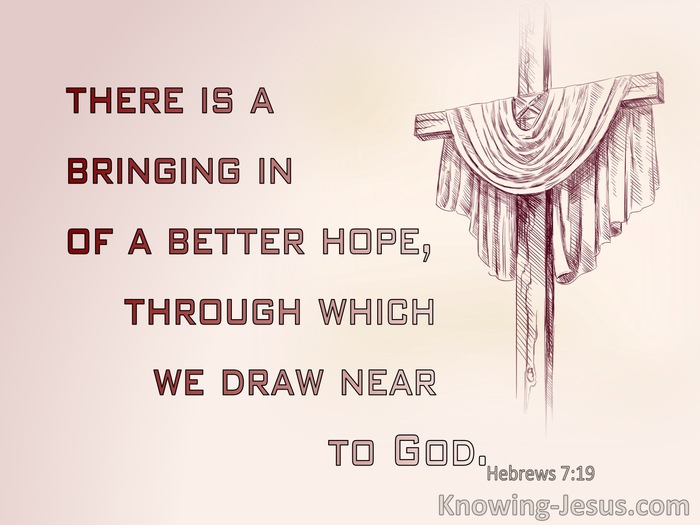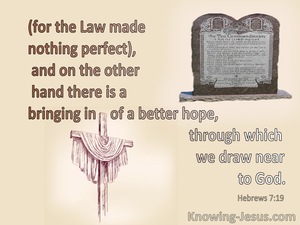Parallel Verses
Anderson New Testament
(for the law made no perfect expiation), and the introduction of a better hope, by which we draw near to God.
New American Standard Bible
(for
King James Version
For the law made nothing perfect, but the bringing in of a better hope did; by the which we draw nigh unto God.
Holman Bible
(for the law perfected
International Standard Version
since the Law made nothing perfect, and a better hope is presented, by which we approach God.
A Conservative Version
(for the law made nothing fully perfect), and an introduction of a better hope, through which we approach God.
American Standard Version
(for the law made nothing perfect), and a bringing in thereupon of a better hope, through which we draw nigh unto God.
Amplified
(for the Law never made anything perfect); while on the other hand a better hope is introduced through which we now continually draw near to God.
An Understandable Version
(since the law did not make anything [i.e., anyone] perfect), but on the other hand, there is the introduction of a better hope [which did bring perfection through Christ], by which we draw near to God.
Bible in Basic English
(Because the law made nothing complete), and in its place there is a better hope, through which we come near to God.
Common New Testament
(for the law made nothing perfect); and on the other hand, a better hope is introduced, through which we draw near to God.
Daniel Mace New Testament
for the law made no man perfect, but this was effected by introducing a better hope, which brings us nearer to the divine presence.
Darby Translation
(for the law perfected nothing,) and the introduction of a better hope by which we draw nigh to God.
Godbey New Testament
for the law made nothing perfect, but the bringing in of a better hope, by which we draw nigh unto God.
Goodspeed New Testament
(for there was nothing final about the Law), and a better hope begins to dawn, through which we may approach God.
John Wesley New Testament
For the law made nothing perfect, but the bringing in of a better hope did, by which we draw nigh to God.
Julia Smith Translation
(For the law completed nothing,) but the bringing in of a better hope; by which we draw near to God.
King James 2000
For the law made nothing perfect, but the bringing in of a better hope did; by which we draw near unto God.
Lexham Expanded Bible
(for the law [made] nothing perfect), but on the other hand [there is] the introduction of a better hope through which we draw near to God.
Modern King James verseion
For the Law made nothing perfect, but the bringing in of a better hope did, by which we draw near to God.
Modern Spelling Tyndale-Coverdale
For the law made no thing perfect: but was an introduction of a better hope, by which hope, we draw nigh unto God.
Moffatt New Testament
(for the Law made nothing perfect), and there is introduced a better Hope, by means of which we can draw near to God.
Montgomery New Testament
(for the Law brought nothing to perfection); and there is the bringing in of a better hope by which we draw near to God;
NET Bible
for the law made nothing perfect. On the other hand a better hope is introduced, through which we draw near to God.
New Heart English Bible
(for the law made nothing perfect), and a bringing in of a better hope, through which we draw near to God.
Noyes New Testament
for the Law perfected nothing,and on the other, the bringing in of a better hope, by which we draw near to God.
Sawyer New Testament
for the law made nothing perfect, but was the introduction of a better hope through which we draw nigh to God.
The Emphasized Bible
For, the law, perfected, nothing; but there is the superinducing of a better hope, - through which we draw near unto God.
Thomas Haweis New Testament
For the law led to no perfection, but was an introduction to a better hope, by which we draw nigh unto God.
Twentieth Century New Testament
(for the Law never brought anything to perfection); and, on the other hand, we have the introduction of a better hope, which enables us to draw near to God.
Webster
For the law made nothing perfect, but the introduction of a better hope did; by which we draw nigh to God.
Weymouth New Testament
for the Law brought no perfect blessing--but on the other hand we have the bringing in of a new and better hope by means of which we draw near to God.
Williams New Testament
for the law had never made anything perfect -- and so a better hope is brought to us, through which we have approach to God.
World English Bible
(for the law made nothing perfect), and a bringing in of a better hope, through which we draw near to God.
Worrell New Testament
(for the law perfected nothing), and a bringing in of a better hope, through which we draw near to God.
Worsley New Testament
for the law made nothing perfect, but the introducing of a better hope did, by which we draw near to God.
Youngs Literal Translation
(for nothing did the law perfect) and the bringing in of a better hope, through which we draw nigh to God.
Themes
Better » The keyword of Hebrews » Better hope
new Dispensation » General references to
Draw near to God » In prayer and fellowship
God » Christ as » Draw near to, in prayer and fellowship
Hope » A better hope brought in by Christ
Law » Bondage of » Insufficient
Melchizedek » A priest and type of Christ
Nearness to God » In prayer and fellowship
New » Creature dispensation » Superiority of the new dispensation over the old))
New » The keyword of Hebrews » Better hope
Priest » Before moses » Melchizedek
Topics
Interlinear
Oudeis
Teleioo
De
References
Morish
Word Count of 37 Translations in Hebrews 7:19
Prayers for Hebrews 7:19
Verse Info
Context Readings
Another Priest, Like Melchizedek
18 For, indeed, there is a setting aside of the preceding commandment, because it was weak and unprofitable, 19 (for the law made no perfect expiation), and the introduction of a better hope, by which we draw near to God. 20 And inasmuch as he was made a priest, not without an oath,
Cross References
Acts 13:39
and by him, every one that believes is justified from all things, from which you could not be justified by the law of Moses.
Hebrews 4:16
Let us come, therefore, with boldness, to the throne of grace, that we may receive mercy, and find grace to help in every time of need.
Hebrews 9:9
which, as a symbol, remains to the present time, in which are offered both gifts and sacrifices that can not make perfect, as it respects the conscience, him that does the service;
Romans 8:3
For what the law could not do, because it was weak through the flesh, God has done, who, sending his own son in the likeness of sinful flesh, and for a sin-offering, condemned sin in the flesh,
Galatians 2:16
knowing that a man is not justified by works of law, but by faith in Jesus Christ, even we have believed on Christ Jesus, that we may be justified by faith in Christ, and not by works of law: because, by works of law no flesh shall be justified.
Hebrews 6:18
that by two immutable things, in which it was impossible for God to lie, we might have strong consolation, who have fled to lay hold on the hope set before us;
Hebrews 10:1
For the law, having a shadow of good things to come, and not the very image of the things, can never, with the same sacrifices, which they offer year by year continually, make a perfect expiation for those who come to them:
John 1:17
for the law was given through Moses, but the grace and the truth came through Jesus Christ.
John 14:6
Jesus said to him: I am the way, and the truth, and the life; no one comes to the Father, but through me.
Romans 3:20-21
Wherefore, by works of law, no flesh shall be justified in his sight; for by law is the knowledge of sin.
Romans 5:2
through whom we have had access, by faith, into this grace in which we stand; and we rejoice in hope of the glory of God.
Galatians 3:24
So, then, the law was our pedagogue that led us to Christ, that we might be justified by faith.
Ephesians 2:13-18
but now, in Christ Jesus, you, who were formerly far off, have become near, by the blood of the Christ.
Ephesians 3:12
in whom we have boldness and access with confidence, through our faith in him.
Colossians 1:27
to whom God would make known what is the glorious riches of this mystery among the Gentiles, which is Christ in you, the hope of glory,
1 Timothy 1:1
PAUL, an apostle of Jesus Christ, according to the appointment of God our Savior, and the Lord Jesus Christ our hope,
Hebrews 7:11
If, then, there had been a perfect expiation by means of the Levitical priesthood, (for with reference to it, the people received the law,) what further need was there that another priest should be raised up after the order of Melchisedec, and not be called after the order of Aaron?
Hebrews 7:25
Wherefore, he is able also to save through all time those who come to God by him, since he always lives to make intercession for them.
Hebrews 8:6
But now he has obtained a more excellent ministry, inasmuch as he is the mediator of a better covenant, which is established with reference to better promises.
Hebrews 10:19-22
Having therefore, brethren, confidence to enter the holiest by the blood of Jesus,
Hebrews 11:40
because God had provided some better thing for us, that they, without us, should not be made perfect.



